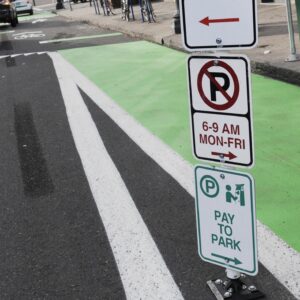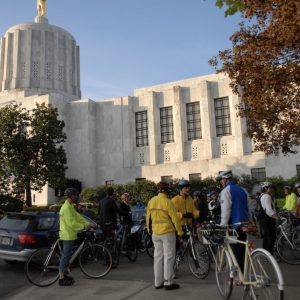
(Photo: Jonathan Maus/BikePortland)
A short session of the Oregon Legislature begins this coming Tuesday (February 1st) and while we haven’t heard of any earth-shattering transportation legislation, there will definitely be a few bills worth watching.
Of the bills filed thus far, here are a few that have caught our attention…
House Bill (HB) 4144
This bill would prevent the Oregon Transportation Commission from tolling Interstate 205, “unless the toll is
used to pay for construction of additional lanes.” It’s sponsored by 10 Republicans and a lone Democrat; Clackamas County House Rep. Mark Meek.
Republicans, led by Clackamas County leaders and State Senator Bill Kennemer, are fighting hard to prevent ODOT from tolling I-205, which they fear will lead to more traffic on adjacent streets and would not be fair to their constituents who don’t have any other option to get around. The state wants to make the section of highway through Clackamas County the first tolled freeway in the region and to use the revenue to pay for widening the interstate and to “manage congestion.”
Earlier this month, Clackamas County Commissioner Paul Savas successfully convinced ODOT to pause their tolling plans while Metro finishes their congestion pricing study.
HB 4139
Sponsored by Corvallis Democrat Dan Rayfield, who was nominated as new House Speaker last week, this bill is aimed at reducing greenhouse gas emissions from ODOT. Specifically, it would require the agency to begin a pilot program to replace or substitute, “certain materials used in constructing or maintaining state transportation system with other materials that enable greenhouse gas emission reductions,” and it requires ODOT to create a new technical advisory committee to oversee the pilot.
Senate Bill (SB) 1558
This is an omnibus bill filed by the Joint Transportation Committee that holds a place for several different transportation-related proposals.
The one below might hasten the adoption of electric-assist cargo trikes and/or other non-car urban delivery vehicles:
Requires transportation delivery companies and third-party food delivery platforms to meet or exceed specified targets for percentage of service miles provided by zero-emission vehicles. Permits Environmental Quality Commission to modify or delay enforcement of targets. Requires transportation delivery companies and third-party food delivery platforms to report information regarding service miles to Department of Environmental Quality.
This one would great to have in place when Oregon adopts an e-bike rebate program:
Prohibits department and commission from adopting or enforcing per-person limit on rebates available under zero-emission and electric vehicle rebate program.
And this one is likely to be opposed by local governments like the City of Portland who are actively pursuing new revenue streams tied to road use, including from delivery companies:
Preempts local governments from imposing per-trip tax, fee or similar charge for rideshare services or food delivery services unless proceeds of tax, fee or similar charge are used only for regulation of rideshare services or food delivery services or funding expansion of electric vehicle infrastructure.
But wait, there’s more!
The Oregonian just reported that Governor Brown will seek $120 million in funding to help move Harriet Tubman Middle School away from I-5. This move is ostensibly about getting kids away from toxic freeway fumes, but the politics are more about clearing a path for ODOT to expand the freeway as part of their I-5 Rose Quarter project.
More bills will be filed in the coming days and weeks.
We’re watching closely for the City of Portland’s attempt to change Oregon law around automated traffic enforcement cameras. They tried and failed last session to remove the current legal requirement that all camera citations must be reviewed by a sworn police officer. This has created a bottleneck that prevents the Portland Bureau of Transportation from processing as many tickets as they’d like.
Current PBOT Commissioner Jo Ann Hardesty is a big proponent of the cameras and reiterated her support for this law change during my interview with her last month. In their adopted 2022 state legislative agenda, the City of Portland confirmed their interest in this legislation by stating under the heading of “Community Safety” that, “The City of Portland will advocate for policies that help make Portlanders feel safe, connected, and welcome, including: Supporting vision zero goals by allowing the Portland Bureau of Transportation to review fixed photo radar violations and citations.”
A source at PBOT said there is no specific bill language yet, but their effort in the short session, “will be very similar to our past efforts on this issue.”
The 2022 legislative session will only last five weeks, so it’s unclear how many bills will get through. Stay tuned as we track all the transportation-related action. If you hear about a bill we should know about, please let us know.







Thanks for reading.
BikePortland has served this community with independent community journalism since 2005. We rely on subscriptions from readers like you to survive. Your financial support is vital in keeping this valuable resource alive and well.
Please subscribe today to strengthen and expand our work.
In the past she was staunchly against traffic cameras. Is think this change of heart may just be electioneering. Especially since her traffic barrel plan to reduce gun violence has been an epic fail.
https://bikeportland.org/2019/07/11/interview-with-commissioner-jo-ann-hardesty-vision-zero-enforcement-distracted-walkers-and-more-302237
I think a faster way to reduce our local (Portland area) greenhouse gas emissions would be to make our bike paths (I-205, Springwater) safe and useable again. Unfortunately now many of us (me included) avoid them due to their unsanitary conditions and lack of safety and end up driving.
There are plenty of alternate parallel options to the 205 path that feel safe. No need to place blame on others for your lack of motivation to hop on the bike.
92nd, 102nd, 122nd… These are the alternatives and they are awful to ride on. I work in the area and ride those streets often. I would not look down on anyone who does not feel safe riding a bicycle there.
https://www.portland.gov/transportation/vision-zero/high-crash-network#toc-high-crash-network-intersections
All high crash corridors that direct you through some of the top 30 high crash intersections in the city.
I miss using the I-205 MUP.
HB4104 is an interesting one. I think this would also prevent tolling of the I205 Bridge that may be implemented if a new I5 bridge is built.
The state needs a strong marketing campaign when rolling the new toll system out. I imagine there will be a lot of push back and a state ballot measure similar to HB1444 if it isn’t.
Fortunately, the bill is dead on arrival. Republicans (and suburban centrists) never want to pay for roads.
I wonder why they don’t have any other option to get around!
This sounds like a great idea, but I’d also like to see a similar bill applying to local freight (originating in Oregon & delivering in Oregon).
The funding to move Harriet Tubman MS is…fascinating. Seems like an attempt to use the cover of “righting past wrongs” around racist development and displacement to justify environmentally catastrophic development and displacement. But I am not a member of that community (or a person of color) so I’ll be interested to see what the reactions are.
Rather than spending $120M to move a school away from harm, imagine if the Governor instead just… removed the harm?
Non-paywalled version of the news about the school relocation:
https://www.koin.com/news/education/brown-seeks-120m-for-relocation-of-tubman-middle-school/
Is it just me or does 120m also not sound like enough money to move a school to an alternate location in the inner part of the city?
Small correction: the start of session is Tuesday Feb 1st.
The language in SB 1558 about removing the caps on EV rebates reads really well at first, but the implications are pretty terrible from an equity lens. Basically it would enable the TNCs (Lyft/Uber) to purchase EVs with a state subsidy while elbowing out the low income individual buyers the incentive is intended to support. Also, as currently in statue, any rebates and incentives still only applies to cars. In summary: there are some implications to this that aren’t great, even though it’s written in green.
Carrie, why does it lead to low-income individual buyers being elbowed out?
Great question. In practice if the state removes the cap per person or the total number of vehicles cap, there is still going to be a $ limit on the amount of rebates funds available. And a corporation with deep pockets who wants to purchase a fleet of vehicles (because the law now says they have to) can use up all the rebate $ themselves. The intent of the current law was to help individuals purchase vehicles, particularly those where the price differential between electric and gas was a barrier. These changes will remove that preference for individuals.
Is there a legal definition of “zero-emission” that narrows that down to tailpipe emissions? Just curious if tire/break emissions count. Or could count after, say, a court challenge.
What happened to HB 4144? It seems to have disappeared from OLIS. Has it been withdrawn?